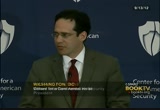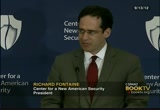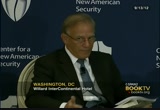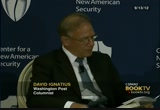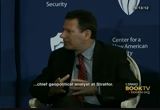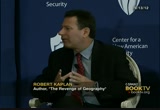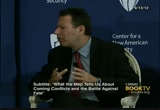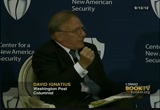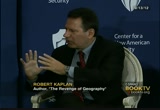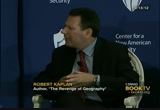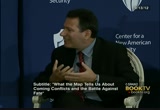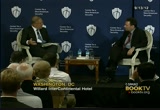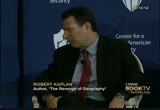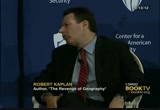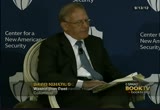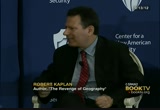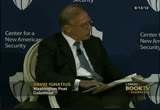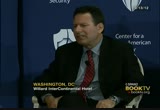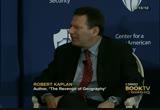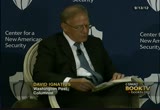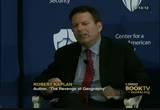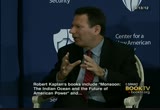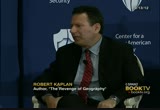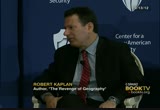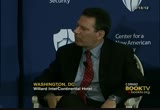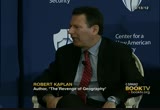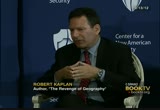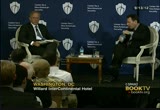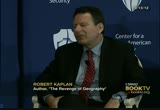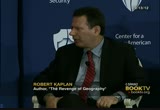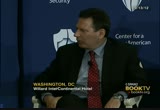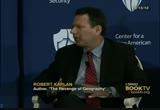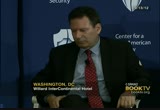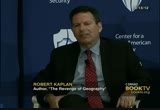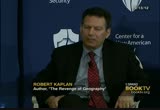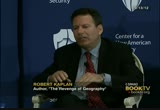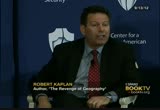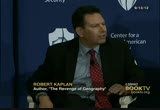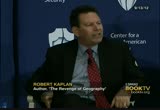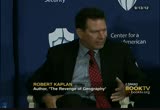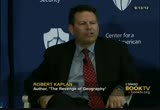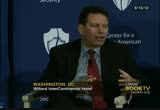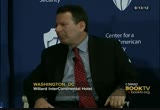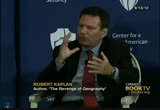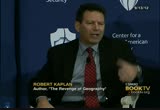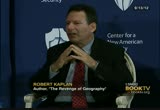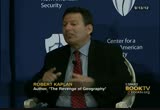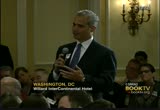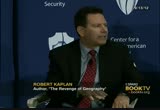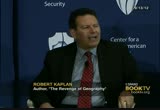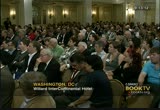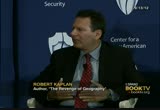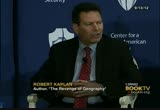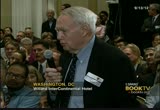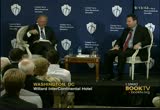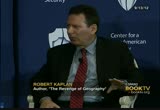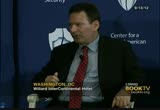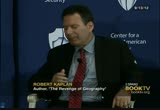tv Book TV CSPAN October 6, 2012 8:45am-10:00am EDT
8:45 am
robert discuss is the will of geography in shaping world events and talks about the role that will play in the future. this is about ten minutes. >> good evening. welcome and thank you for joining us here. my name is richard fontaine the president for the center of new american security. it's a pleasure to welcome you
8:46 am
to celebrate publication of the look of the revenge of geography with the map tells us about conflicts and the state. i've heard it said before that you honor agreed author not by reading his books but by buying them. you will be happy to know books can be sold after the conversation on the stage in this room. bob kaplan's work is well known to many in the audience he's been a fellow at cnas and a correspondent for atlantic for about a quarter of the century and is currently the chief geopolitical analyst. i became acquainted with his riding through the book arabist which is a group of westerners living and working in the middle east. since that book, the title of the work, the coming anarchy, imperial grounds have provoked intense debate in policy
8:47 am
circles. the most recent book monsoon and the future of american power has become required reading by those that interest in the future of strategic competition. as i've gotten to know bob i've learned he's not only a superb journalist, scholar and thinker but also a warm and wonderful human being who demonstrates a truly remarkable curiosity. i believe we are the only to the decided to get their and our spare time. now he graces us with his new book the geography. counterintuitive the what may seem the way to grasp what is happening in the world of instantaneous news is to discover something basic. the special presentation of the humanities division, possibility and constraint the map leads us to the sorts of questions. that is a provocative argument and one that we will examine in
8:48 am
detail. joining in that conversation as david ignatius one of the former strategic thinkers and his own right. a columnist for "the washington post" david is a renowned writer of fiction and nonfiction in the blood money published last year his most recent in the best selling works of fiction. he's known for his command of international affairs and his insight in the workings of government and other actors. with these gentlemen we are poised for an illuminating conversation about the world, the future and the revenge of geography. bobbit and david, over to you. >> i think you're probably not supposed to see the serious moderator by but i love this book. it's ridiculous how many yell will post its i've put in it. i'm not just doing it to flatter the teacher because i really like it and i want to try to walk the audience through this
8:49 am
or have him what the audience through and i would like to start with a provocative opening comment. you said my reporting of for three decades convinced me we need to recover the sensibility of time and space that has been lost in the information age's when they dash across the continent which allow us to talk a lot of the distinguished columnist tom friedman labeled a flat world. instead level introduced readers to the decidedly unfashionable figures to push up against the notion that geography no longer matters. i want to ask you to start with the basics of geography and tell us why mountains and rivers and planes matter so decisively.
8:50 am
>> well, david, with so many opinion writers and pages the distinguished literary journals are concerned with, and this is epitomized by tom friedman's work that i respect greatly is that what we can do -- it's all the things we can accomplish if we have the right solution. but i am doing is saying that's fine. that's human agency fighting against it but what i am showing you in this book is the other side. i'm not disagreeing but i'm saying there is another reality, the formidable barriers if you do not respect you can never overcome and chief among those is geography which is so basic that it goes unremarked upon. if you want to know about a country look at the map of the
8:51 am
united states in terms of the harbors from the east coast of the united states, the 13 colonies jam packed with natural harbors. the coast of africa collectively few good natural harbors but the east coast was packed with them and the continental corporation of the u.s. was the last resource rich part of the ten per zone the european enlightenment with inland waterways flowing in a convenient east west fashion than the west the caressed combined and our ideas and dhaka sees but because of where we happen to live as well that's
8:52 am
why these things matter. why these things matter. they've allowed india and china to develop into the completely distinct great worlds of civilization we have much to do with each other through long periods of history. >> let's take that image that you've offered of america, this place with all these great natural harbors and rivers that run the right way but that was true for thousands of years and didn't leave it to the development of what we think of as the united states. it wasn't until the european civilization a rise and began to make use of those harbors and rivers they were obvious so help
8:53 am
us think about why it's the geography we spoke upon based to the cultural with the supposition one aspect. >> phyllis do ha and -- that was unable to cross across a land of the voyages of the development of technology will let shortened the distance it did not negate geography. it needed more precious and important as it opened up a new geography to the world conflict system and world trade system. culture and economics and people flow from the geography because what is culture? the accumulated experience of people on the landscape over hundreds of thousands of years that leads to the traditions and habits that can be identifiable. one of the places i have the a
8:54 am
identifiable culture is remaining. nobody can mistake that there is a remaining culture that's been formed by the conflict between the invaders coming from central europe and those coming from the plateau which fostered a suspicious character you can see into the politics in this day and i can go through every country where many countries and talk about that. >> talk a moment about germany, one of the arresting images in the book is your description were quoting the german historian who call the germany a big prison meaning was caught between the north sea's and if it wanted to expand it could
8:55 am
move east or west. that sounds like the kind of analysis the was popular a century ago but has gone out of fashion and explain to us when we think of a germany today what your analysis will tell. it's been a key was the son of the great novelist and he wrote a great history of germany, and his point was germany has natural boundaries to the north sea is to the self and further that in the east and the west germany had a war over the century with france or that area or with poland and because germany was a continental power, it's sandwiched between maritime europe on the one hand and the
8:56 am
heartland of europe towards russia on the other. it was always problematic which way it would go and how it would develop. i came across this book by accident in early 1989. the berlin wall and i've been back-and-forth and it occurred to me after reading this book the berlin wall or the dividing line between eastern and western germany was one german history that germany would reinvent itself in different territory always so today we have a united germany that trades with poland had a rapprochement with germany and they've had the baltic states where they would keep
8:57 am
russia it out and the germans down and now they are triumphant economically. they may not that berlin is the point of arbitration for all of them. so the question of rises and this gets back to geography with russia still meeting buffer zones in eastern europe. the collapse didn't end russia's in security. the lithuanians and french throughout history as a regional power flush with natural gas, a rich and wealthy germany but the polling that we now know has a significant storage of natural shale gas which may make it an energy power into the 21st
8:58 am
century so this is within geography. estimate your argument about russia and russians in security would basically be it's too flat. >> it has half of the world's longitude, but it's flat, it's indefensible, its rivers run north and south rather than east and west so they don't unite the country and it has less people than bangladesh. 141 million people bangladesh has more people commesso vladimir putin's cynical neo imperialism are the wages of the could be the geographical and security and that is how we should understand it not as a mad man or a totalitarian but as a very traditional russian autocrat. >> one of the interesting pictures of this book is your discussion of the fall of the berlin wall and if i read you right to say that it made us too
8:59 am
optimistic. our system of democracy and free markets would have a transforming power. talk about that and take that story through the 1980's and 90's. >> the berlin wall and eliminated constraints. we thought because we could get the red army out of eastern europe it suddenly would have transformed it affect in the middle east and sub-saharan africa of the world would be open for democracy. a democracy would come in all of those places but it would be bloody. in the 1990's, and this was the genesis for the book, i saw how the u.s. military particularly the air force defeated geography in the balkans. it turns out the did mountains
9:00 am
9:01 am
and all we did was to transport one marine battalion from one place to another. no fighting in between. wasn't particularly dangerous but the logistics were absolutely -- gas stations, mountains of water bottles and full tents and meals ready to eat. it was an immense logistical exercise to get men and women and material from northern kuwait to fallujah without any fighting and you see how distance matters. how you just couldn't defeat distance through the latest technology. >> might be interesting for this audience if you personalize the story of iraq a little bit and talk about your own views. this is a place you traveled in
9:02 am
with saddam hussein, you were a supporter of the war. explain why. i found some of the most wrenching passages in this book discussions about what a disaster the iraq war has proved for every party in the united states, most of all the iraqis. >> i knew iraq intimately in the 1980s as a reporter. huckabee airtran/iraq war from the iraq side. iraq was like a vast prison yard under saddam hussein. it was so suffocating that i can compare it to no place in the arab world but i could compare it to romania which i knew intimately. to go from saddam hussein's iraq to syria was like coming up for
9:03 am
liberal humanists bare. we tend to say all dictators are bad and all democrats are good. we eliminate -- we e. race distinctions and it is distinctions that give us the complexity we need to understand the world and assad ran a brutal dictatorship but nothing like saddam hussein. i had my passport taken by the iraqi authorities when i was in iraq -- i was very nervous obviously. i only got back to the airport before i left. i was a journalist who got too close to my story and i was intent on eliminating saddam hussein. i believed like the lot of people, different western countries in the world and on both sides of the aisle that there were wm ds and i believe a regime this suffocatingly brutal you couldn't trust.
9:04 am
you had to assume that it existed and the work turned out so miserably. had we had different generals and different strategy could have been different. you can't simply say it wouldn't have mattered no matter what we did but on the other hand a lot of the mistakes we made were implicit in the hubris of the conception because we can play counterfact wills all we want but at the end of the day you are stuck with the fact you have and you have to live with them and deal with them. >> you add up the costs. almost 5,000 americans dead, perhaps hundreds of thousands of iraqis killed, a trillion dollars in costs and you said even if everything turned out great and iraq somehow became an
9:05 am
american ally, was the democratic it would be hard to justify. this line struck me. iraq undermined a key element in the mind-set of some that the projection of american power always had a moral result. that is really an argument that iraq was fundamentally immoral. not only a failure but immoral. >> even democracies that have the best of intentions can take action that have a moral or immoral results depending on how they carry it out and how they think things through. not just one step in advance the five chess move the head of the time. this gets to a discussion later on about realism. what is realism?
9:06 am
realism is more a flick -- sensibility that the philosophy. you recognize interest over values because if you recognize interests you will be careful about where you get involved overseas and if you recognize interest you will respect the interests of other nations and compromise where if you make values your leave, you are liable to demonize your opponent as immoral because he doesn't agree with you on values and therein lies war and conflict. precisely because they expect conflict, less likely to overreact than moral and realists also value order and freedom because without some semblance of order freedom doesn't mean anything. people can't practice search in the first place and that was another thing i learned about
9:07 am
iraq which was even the tyranny of saddam hussein as for the less it was precisely because it wasn't tyranny there were rules. people could get around and daily life was predictable. you knew what was not allowed but in a state of anarchy which iraq descended to in 2006 and 2007 there were no rules. >> you also talk in the book about two governing analogies. the munich analogy that compromise is fatal. look at how munich led to the second world war and the rise of hitler and the vietnam analogy which argues the limits of power. the realist argument you are making at efforts of big transform of rolls of the dice
9:08 am
often have very fortunate results and you really talk about foreign policy as being two ideas for analogies at play. i would be interested -- i end of thinking you are a vietnam analogy guy. of munich -- that you wouldn't subscribe to that. am i reading you right? >> wet me say realism leads to the spatial representation of humanity's interests in the first place and that is how i discussed geography which dominates the rest of the book. you have to take them both together. you can that be a munich guy or vietnam guy. it is an analogy that tends to thrive when the country has been in peace and prosperity long
9:09 am
enough. it feels it can intervene on behalf of subject and oppressed people around the world and doesn't think about the costs because it hasn't had to pay the cost for several decades. vietnam is about taking care of one's own and taking care of how things can go so horribly wrong. if you are a total vietnam person you will be such an utter realist that it will be too crew. you won't have anything beyond interest and a nation requires ideals for self identity to define itself. you will be intervening every time there is a massive human rights atrocities. you will have troops in five different places at once so only when the two analogies are put
9:10 am
together that a stable policy can emerge and get public support over the long term. >> i am sure the audience is going to want to hear about current affairs. we are in the middle of a week in which we are seeing just how unstable this great big part of the world, the middle east and then your east can be, extending as far as bangladesh. through the lens that you have developed in this book, the analytical approach, what you would say to policymakers as they figure out how to respond to an islamic world is exploding with a anger and instability. >> communication technology has collapsed distance.
9:11 am
rather -- it has increased because you have people in indonesia who care vitally about what the israelis did interrupting the flotilla and bangladesh and tomorrow we may see malaysia and indonesia and elsewhere enraged about a movie that was made in california. but while rage can spread around the world, rage is a starting point. once you start to analyze what is likely to happen in libya or what is likely to happen in egypt you get very different -- what is liable to happen in syria -- you get very different scenarios based on the legacy of geography. geography shows libya was a
9:12 am
vague geographical expression. we are oriented toward greater carthage and tunisia were benghazi towards alexandria and egypt. because it was never a country it can only be governed through the most austere totalitarian means and once that collapsed the we have an elected government in tripoli it cannot project power beyond greater tripoli. you have a problem of governmental incapacity in libya that cannot deal with the crisis. egypt is different. egypt you have a country that has been an age old cluster of civilization for years. a cohesive community along the nile aware the government has greater bureaucratic and institutional power even under this new tenuis regime than the government in libya. the government in egypt has an army and police forces but the problem is political. can an islamic government take
9:13 am
action against islamic them craters demonstrators. >> to take the other issue you are talking about this week, iran is a big theme in your book. you talk in one chapter about the iranian pet. the prime minister of israel sees iran very much in terms of the munich analogy. iran heading for having nuclear weapons capability that could threaten the existence of israel so the policy conclusions from that, you have a broader geographical and historical analysis. hi am curious what you say about the decisions we're looking at over the next few weeks, months, 12 to 18 months. what would your advice be? >> iran is a much more serious
9:14 am
state than saudi arabia warm any in the world. there have been persian speaking governments on the iranian plateau going back to into equity. iran is synonymous with the iranian plateau which is on the caspian and persian gulf, the two oil-rich portions of the middle east and pipelines open to central asia on one hand and down into iraq on the other. this iranian regime may transform itself and may be overthrown in a couple years that there will always be an iran and great iranian power on the iranian plateau. saudi arabia is more tenuous. creation of a family. it is not synonymous with the arabian peninsula. there are many other countries on the peninsula's borders, artificial in the center, always
9:15 am
had trouble keeping in line, where the holy cities are. iran is strongly institutionalized. it is not a 1-man sophistic -- it has different centers of power against each other in a complex bureaucratic border. the gift of the iranian plateau and geographic legitimacy provides the government over millennia. i would say our grand strategy has to be that the u.s. has been estranged from iran for a third of the century, a decade longer than we were estranged with red china between 40, and 72. at some point and this is what
9:16 am
the saudis really worry and think about, there has to be a -- with iran. we have to think in those terms. does going to war -- all of iran supports a nuclear program but it is unclear that iran supports nuclear weapons. there is a distinction. so the real critical factor is what do we need to do to normalize relations with iran. the answer to that may be a strong military reaction if they weapon is. the long range strategy, the road map to normalizing u.s. relations with iran. >> interesting and good answer. it may well be that confrontation is the normalization neither side seems able to achieve now.
9:17 am
my time as the audience is about to begin, a couple questions about the conclusions of this book which are really fascinating and counterintuitive. one conclusion as i read it is the u.s. should think about how to withdraw sensibly, gracefully from its role after the second world war as the overwhelming dominant power, that process of resizing american power if you will is essentials. am i reading you right? explain that. >> the u.s. has to think about how we over the decades and centuries make a graceful exit from history as the dominant great power. rome was overcome by what they
9:18 am
called barbarian tribes. that may be inevitable in the long term but it was not inevitable in the way that it happened. romo stopped evolve thing. rome became too brittle. it makes sense we need to to gradually and organically offload responsibility to like-minded others and allies around the world rather than us covering so totally the military burden. let me talk about asia in this regard. china is evolving a significant sea power. this is normal because china's land borders are more secure than they have been since the early nineteenth century. china is secure on land and can afford to go to sea in a matter that it hasn't had previously. does the u.s. continue to dominate the western pacific? the u.s. navy and air force to
9:19 am
the same degree it did throughout the cold war and post cold war or does the u.s. try to encourage countries like japan, vietnam, the philippines, malaysia, australia and others to bear more of the burden? that is what i mean by a graceful exit from history. >> the audience discover through your questions with the main conclusion of the book but i was to ask before we turn it over, how can you respond if in the back row of the audience mitt romney stood up and said mr. kaplan, you are being defeatist. you are walking away from america's historical role, america is the essential power and you are talking about necessary decline. >> i am not being defeatist.
9:20 am
i am being sly. i want american influence to extend long into the decades but it cannot do that bearing the same exact level of burden we have been bearing now. in the middle east we cannot confront russia, cannot confront china and be the hegemon in the greater middle east in leslie. we have to move closer to vladimir putin to balance against china but at the same time not let countries like vietnam and the philippines drag us into a war with china over the south china sea. it is about clever balancing and in any case the u.s. has so much shale oil deposits in texas, louisiana and other places i could name which is about geography that we are going to be because of energy reserves going to be a significant power for decades to come in any case so now is the time to try to get
9:21 am
allies and like-minded others to do more. >> this book has on the cover blurb from henry kissinger. this is obviously a set of arguments to consider very seriously. let's go to the audience for questions. keep your questions free and identify yourself. yes? >> hello. i am from the world of politics and wanted to ask you about russia because the argument that you present about russia and security has been essentially used, the argument has been employed to justify pretty much any and all expansion from moscow and the soviet period.
9:22 am
what about the interests of the country's around russia that are impacted by this alleged russian need for security? >> this russian need for insecurity goes back centuries but vladimir putin is not trying to recreate the warsaw pact. won't invade the baltics. the limited invasion of georgia is all he can muster. russia lacks the military band width to take back central asia. he can forgive loans, he can maneuver around, but swedish banks are very busy in the baltic states. the polish military is developing yet the russians are trying to acquire electricity grids and other infrastructure
9:23 am
and banks now that the european union lacks financial capacity to develop places like serbia and ukraine the way they did in the yearly part of the last decade in the 1990s so russia is not coming back as the new soviet union. it is a substantial regional power that can be contained through normal means, through negotiation and arming our allies. why did the poles and romanians bill along with us on missions in iraq and afghanistan and special forces and marine tee placements in sub-saharan africa? not because they support everything we do but because loopholes and romanians and others know that it is not native of per se that will defend them. it is the united states.
9:24 am
in the first row. i think they've of like a microphone because this is being recorded and broadcast. >> department of geography from the ohio state university. as a professional geographer i want to thank you for the past decades for putting geography into the public consciousness. my first question to you is recently there has been territorial disputes among china and japan and south korea. what is your feeling about what is going to happen next and what strategy the u.s. should take for competing with china in order to secure american security? >> what has been happening from japan and south to indonesia,
9:25 am
the east and south china and the sea of japan, in the 50s and 60s and 70s all these countries were internally focused. developing their own economies and national capacity and military. vietnam and malaysia have internal wars of rebellion and nation-building. the philippines had a rebellion in the 1950s. japan was just coming on line as a significant power in the 1970s and it was korea that developed into a significant power. all these countries have developed already and because they have developed they now have the ability to project power halt word into the. territorial soil they claim. they didn't have this capacity.
9:26 am
we see conflict about island and geographical features below water and high tides that we never saw before. people say has everyone gone crazy? no. everyone has developed in east asia and they have military's and developed navies and air forces and conflicting conflict over geographical space. of battles over geographical space and not about ideas. there are no ideas involved. this is all about territory. this is about status, about national status. people fought in europe that nationalism was out of fashion. we are in a post national age. that is not what i see in east asia. i see nationalism as very feisty and healthy. >> one of the interesting things in this book, ideas about
9:27 am
globalization and the end of national boundaries. >> thank you very much. base in bay ridge, lebanon, can you give an interpretation why there was a double veto by russia and china with regards to a serious situation, three times over. do you think there's any impact of this week's events in libya, egypt, yemen and others on the approach of this administration to the city in crisis? >> let me say china is a bit far afield but russia has interests. the way the russians see it is they suffered a setback with the
9:28 am
overthrow of gaddafi, the demise of saddam hussein, who despite all the end about how we supported him in the iran/iraq war, closer to moscow at the time and much closer to the united states. russia cannot be happy about the possible loss of another ally in the middle east. russia has a certain degree of interest in a naval base searched in the eastern mediterranean. more importantly russia knows, vladimir putin knows central asia is presently a powder keg that gets much worse news than it deserves. if you think the arabs spring was tumultuous and violence you will love central asia. because central asia did not have european liberalizing effects on intellectuals like the arab world, it had
9:29 am
completely polarized by stalin. i can go on. central asia could be a tinderbox and the last thing russia wants to see is an islamic state in syria that becomes a model or a symbol for anything that might erupt in central asia. russia's interest in trying to keep us in power if possible, understandable legitimate interests that stem from russia's geographical situation. >> we have so many hands we should probably let other folks ask questions. >> thank you for being here.
9:30 am
department of defense. my question is the strategic rebalancing to asia. is this an attempt to contain china and given the geographic problems china has being surrounded by numerous ethnic states and not to mention india and hostile southeast asian powers the strategic rebalancing will be effective? >> i was in beijing recently and in beijing there are thousands of american businessmen and students and chinese students. you can't use the word containment because it has a cold war vintage that doesn't capture the complexity of the relationship between the united states and china. speaking about the event i think it was a natural occurrence that would have happened no matter
9:31 am
what it was called for term because we are concluding two ground wars in one part of the world. in previous decades and centuries when the u.s. concluded ground engage in this often retreated into semi isolation. this was true after world war ii with the korean war that gave harry truman the political space he needed to send troops back to europe. we didn't want to treat into isolation. it was meant to be a real direction of policy to asia after the berlin wall fell but saddam hussein invaded kuwait. we got involved in a war in iraq and more importantly the army and navy got involved in no-fly zones in iraq right up through the next 12 years. there was the iraq war in afghanistan so the is saying we
9:32 am
are back where we were in 1989. we had two decades of destruction so now we are going to show asia we are there. we are back. we are engaged. the problem with the pivot is it implies you could turn your attention away from the middle east. with the middle east shows is you can never turn your attention away. that is the real challenge. >> i want to turn to this side of the room. the gentleman with a blue shirt and you. we will go in reverse. >> former government -- talking about geographic divides you mentioned in your book you make reference to the u.s. and mexico and house do you view the
9:33 am
effected of things such as transnational criminal organizations and confluence of radical extremists, the movement of iran into venezuela and the fact the we have a large border that is essentially flat. >> in my book talking about mexico because i believe anomaly is shining and the greater middle east crucial to the u.s. destiny but mexico is on the same level and on the same level of importance because latin history is moving north demographically. the average guatemalans is 20. the average mexican is in late 20s. the average american -- much longer populations growing at faster rates and ours and whatever we do with immigration there will be more latin speaking people in our society. donald flynn be wrote in the
9:34 am
early part of the 20th century when you have an artificial border where much of the southern border is between a highly developed society and and economically less developed society the border doesn't stay stable but moves in the direction of the less developed society which ultimately finds a way through immigration and what not to find a more developed society. mexico has seen 60,000 deaths in violence since 2006. that is 2 times the death in syria but over six years and most of those were in the northern third of the country and the u.s. border. recently violence has dropped in northern mexico but that is because the cartels are consolidating their control and setting up real honest to
9:35 am
goodness geographical spaces. i am close to the u.s. border so the way mexico develops as a society, i believe will impact us more over the long run than what happens in iraq or afghanistan. >> to push you on the policy implications of that, that is another major conclusion that geography tells us the southern border with mexico will be crucial but in light of what you said, this is an inevitable zone of conflict of pressure is moving the board in effect northwards, what is the wise policy for the united states? >> we have to be very careful about intervening because of sensitivities that go back to history. we fought a war with mexico. we have incursions' in to mexico under general pershing. everything we do in mexico has
9:36 am
to go through a tight diplomatic filter. that being said, there is more we can do in terms of helping the mexican authorities than we have been doing. the ultimate power of the united states is the time that our top decisionmakers can devote to a problem in a given day. that is why we can't have 33 wars or two wars going on at the same time. if we have a no-fly zone in ceo or the persian gulf erupts or the south china sea here rafts we would have trouble handling that. if we can have more top decisionmakers spend time on the mexico probably would come up with more bowls, innovative ways to help the mexicans who by the way, there's another side to the mexican story. mexico was one of the world's
9:37 am
leading economies. the economy has been growing last few years impressively. it is not a country you can easily categorize or make into a cliche. it is incredibly dynamic but incredibly dysfunctional and lawless at the same time. the gentleman behind the last questioner. >> i was a lawyer for the foundation. another region that experienced stability and conflict the last ten years is west africa. you look at it as terrorism or drug trafficking, poverty. when you look at the map of west africa what do you see? >> in sub-saharan africa i see after no growth and all bad news and the 1990s since the middle of the last decade have african economic growth has been 7% which is the most impressive in the world. you have to subtract from that
9:38 am
the 2% of population growth which makes it different from the rise of the asian tigers and no real manufacturing development in west africa or elsewhere in sub-saharan africa. south africa is an exception and the manufacturing and developing of institutions that show countries out of the woods, what we have in west africa is the wars and rebellions have burned out but nothing much is happening in the way of stabilizing institutions for developing strong economic bases. that may come later. the ivory coast was in war only until 15 months ago if memory serves. it takes a while. it might be china and places like bangladesh are becoming too expensive for textile
9:39 am
manufacturers and so the question is who is the next china or the next bangladesh? it won't be one place but it is possible countries in sub-saharan africa could become the new destination for textile production which would stabilize the economy and provide jobs for young people. while i wrote a very pessimistic article in the atlantic monthly on africa in 1994, the things i worried about played out in the late 90s and the early part of the last decade in terms of wars throughout the region but i see sub-saharan africa on a more positive trend. >> interesting that the chinese seem to agree with you with their level of investments. >> second row on the side. >> after rule of law committee
9:40 am
for the oceans, in the mid century, nicholas said geography was one of the most important factors in foreign affairs because it was the most permanent. this year we just saw the arctic icecap dropped another 750,000 square kilometers and appears to be opening more this session. what do you think this trend will mean not next year or even next decade but in a generation as that becomes more open for russia and canada in particular. >> nicholas pikeman is someone i devote a whole chapter to in this book because he is very provocative and here is the man who when it was unclear that china where defeat japan, predicted that china who is our ally at the time would become our adversary for geographical reasons and also said when europe was fighting for its life
9:41 am
against germany, united europe could be a competitor for the united states. she was very clear volume. in terms of the arctic icecap, this is playing out over decades. if you had an arctic open for shipping and a close friend and unveil the northwest passage precisely now because of what you bring up and up greenland and you can have shipping in the northern arctic and this is not covered in the book unfortunately, that could provide alternative routes. that means somewhat less of an emphasis on the indian ocean which i wrote my last book about. it would bring russia closer to america very fundamentally through the north. it would make canada a significant geopolitical player
9:42 am
in world affairs to a degree that it hasn't been because with the canadians you have shale gas, tie sands, incredible energy and hydro power resources and if you have an open arctic, geopolitical position would be that much more significant. >> the gentleman in the third row. >> i would like to offer a quick comment on what you noted before about the u.s./iranian relationship that it needs to go over the next decade, you are not casting agency on the united states but also on iraq to some level of serious behavior change on their part. my question is looking into the future.
9:43 am
you talk about and burdening the u.s. responsibility for maintaining the international order. which countries do you envision in south america, africa? you have written about india. which ones the you imagine being major regional powers alive with the u.s. and share our objectives? >> brazil would not be totally alive with the u.s.. brazil has carved out independent identity. when i was embedded with special forces and always had trouble making arrangements to do training missions in brazil. the brazilians were a bit standoffish compared to everyone else in america. brazil because of geography is close distance between here and west africa, over the course of the decade to establish soft influence in west africa if west africa were to develop.
9:44 am
brazil would not be hostile to the united states i don't believe but it would certainly be -- with its own point of view, as my colleagues know that may lead at some point to the u.s. to moved closer to argentina and develop argentina's military to balance against brazil. this is really long-range thinking. the best piece of strategic good luck that the united states has gotten since the end of the cold war has been the military and economic rise of india. india has had economic problems very recently. it has been over-in many ways but if you compare india in 1991 with india in 2012 it has been an enormous developments. we don't need an alliance with india. the indians would reject it at
9:45 am
any rate. the indian policy establishment in new delhi, the intellectual establishment would reject it as like a disease germ. it can't be a transactional relationship. what we have to realize about india is where it is on the map. economic and military rise automatically hads and balances against china. we should not try to get concessions from india or anything but encourage development in any way that we can. >> yes, sir, right here? >> i am a geographer and your presentation, your book, especially interesting, i would
9:46 am
like to ask a question. outside the organization -- everything here is clear. america, russia, america know, russian yes. my question. please tell someone about israel, a country which exists despite geography. >> russia and america have completely different geographical perspectives and different geographical situations so that their interests are different and often clash but we have to
9:47 am
recognize that we don't have as hard and ideological disagreements with russia today as we did during the soviet union. there is still a philosophical difference because of the way russia is governed and the way we are governed but it is not nearly as distant as it was during the cold war. we should think of ways we can employ russia as a balancer in many parts of eurasia. as i mentioned in the book is real a exists in defiance of history because for thousands of years -- and let me say this about israel's geography. and to jerusalem. it is a singular urban corridor. with the size of new jersey.
9:48 am
of country like that cannot absorb one nuclear strike. even during the cold war there were cynical calculations. the u.s. would go on as a country and we would -- russia made similar calculations. and would not be killed would have higher cancer rates because of the small size of the country. they cannot absorb a first strike and that geographical in security is at the heart of the fact that israel has different red lines than we have. and our interest and is really interests overlap with significant extent that can
9:49 am
never overlap to the total extent and other areas and issues where their interests were different from ours. this may be one of them but iran is a much bigger country. iran can absorber a nuclear strike and an israeli response to a first strike would be disproportionate. it would be illogical to use a very mild term for the iranians to actually web and eyes, i think. i think it may be that iran's real power is where it is now where it has tremendous nuclear capacity but doesn't have a weapon. it isn't quite to the point where it has the enriched uranium. now it has real power but once weapon is, is perennially insecure 24 hours a day. what would it do with six or
9:50 am
eight nuclear-weapons, low-quality tactical nuclear weapons? there would be no second strike capability. the scottys will import pakistani weapons and iran would be much more insecure than it is. >> one of the powerful themes in this book is the survival of the jewish people culminating in israel as you -- a question here. >> professor of american geography. i wonder what can be done for sales of more books. [talking over each other] >> i agree.
9:51 am
what can be done to reawaken americans to the realities you have so skillfully displayed for us? i would conclude on that point. >> geography is something that may not be fashionable. it is like a 1-room school house. everyone is intrinsically interested in geography. you know what books so often in bookstores? military history books. they don't get reviewed much and are often badly reviewed but they sell very much. people implicitly grab that the ancient history is military history. the classical age is really about military history. same with geography. there is a natural inclination to look at a map and the fascinated by a map. when i was a little i loved aaa road maps that they don't make
9:52 am
any more. there was a hand in the back. book like glenn welch but i may be mistaken. >> you are pretty optimistic about the u.s. immigration laws. you talk about asset stripping the rest of the world of its best and brightest. how do you expect us to get there from where we are? >> i think we are already getting there. for instance, i have a close personal friend in oregon who told me you know what was the ultimate result of the iranian revolution 1878-79? all the brilliant middle-class iranians move to the u.s. and got business degrees and search of business and did well. we essentially took the best and brightest, not just the shock's wealthy friends who never earn their money but the strata below that all came to the united
9:53 am
states. whenever there is an upheaval in any part of the world we get more of the best and brightest. i think this has been happening -- look how society has changed so dramatically over recent decades. the change in diet and food. we are becoming more of an international nation, global duty free hot zone for world transaction. >> what a wonderful description. the shining city on a hill. we have time for one last question. i see a hand all the way over there. yes, sir? >> thank you for your time. if you could give a quick comment on what the map tells us about prospects for arab-israeli peace in relation to water scarcity issues in the middle east. >> turkey has all water. that is why turkey will be a
9:54 am
great mid level power in the twenty-first century. i discussed israel for four pages in this book. that part of israel. this is where i come down to scheerer unfortunately geographic determinism. this is about territory that is very precious. despite all the technological developments. it is more precious because there are more and more people in this disputed territory. whether it is really settlers or a rising arab birth rate. it becomes harder and harder to achieve. in the last few years while we have been preoccupied with iran, is really settlement building has been rather robust. this doesn't get much news now, but facts are being created on
9:55 am
the ground that it will be harder to reach a solution and i have not given any policy recommendations. let me give one which should be scheerer common-sense which is what i think james baker showed so ably when he was secretary of state which is for there to be any arab-israeli peace given the geographical imperative, the u.s. has to be involved as an honest broker in a pro-active way. >> as i am sure you have seen in this discussion, this is a provocative book. i urge people to buy it and read it and i think bob is prepared to sign some. you will want -- please join me in thanking bob. [applause]
9:56 am
[inaudible conversations] >> is there a nonfiction author or book you would like to see featured on booktv? send us an e-mail at booktv@c-span.org or tweak as at twitter.com/booktv. >> this is the first parish church in brunswick, maine. it is significant to the story of uncle tom's kevin. the story began here. it is here in q number 23 that harriet beecher stowe by her account saw the vision of uncle tom being whipped to death. uncle tom as you probably know
9:57 am
is the title character, the hero of her 1852 novel uncle tom's cabin. of uncle tom's cab and was written as a protest novel to the fugitive slave law which mandated in 1850 that anyone in the north where of the abolitionists live, if anyone was to aid or abet a fugitive slave, they themselves would be imprisoned or find for breaking the law. this was the fugitive slave law bill seen as a compromise between the north and south to avoid law -- war. that is what the novel was trying to do. i am a person and i am against slavery as was most of new england and it is my right to help a slave who finds him or herself in our borders. we have a right to do that. we are not a slave state and we should be allowed to practice our laws as we see fit.
9:58 am
>> more about. beecher stowe this weekend as booktv, american history tv and c-span local content vehicles look behind the history and literary life of augusta, maine on booktv on c-span2 and sunday at 5:00 p.m. on american history tv on c-span3. >> here's a look at the upcoming book fairs and festivals happening around the country. the seattle aquarium book fair will take place october 13th and fourteenth focusing on rare books, prints and photographs. this is the twentieth anniversary. the west virginia book festival in charleston is on october 13th and fourteenth. the author of a series of books that hbo's truth blood is based on will be featured. on october 14th, the three day 7 festival of books in nashville, tenn. featuring many well-known
9:59 am
authors in every genre of writing. on october 27, 1028, we attended texas book festival in austin. this event started in 1995 by first lady laura bush and is held at the state capitol building. please let us know about book fairs and festivals in your area and we will lead them to our list. e-mail us at booktv@c-span.org. wall street journal reporter r kirsten brind talks about the collapse of washington mutual, the largest bank failure in history. this is just over an hour. [applause] >> it is wonderful to see a great crowd in one of america's great public libraries and reminder of why the commons are so important
189 Views
IN COLLECTIONS
CSPAN2 Television Archive
Television Archive  Television Archive News Search Service
Television Archive News Search Service 
Uploaded by TV Archive on

 Live Music Archive
Live Music Archive Librivox Free Audio
Librivox Free Audio Metropolitan Museum
Metropolitan Museum Cleveland Museum of Art
Cleveland Museum of Art Internet Arcade
Internet Arcade Console Living Room
Console Living Room Books to Borrow
Books to Borrow Open Library
Open Library TV News
TV News Understanding 9/11
Understanding 9/11
